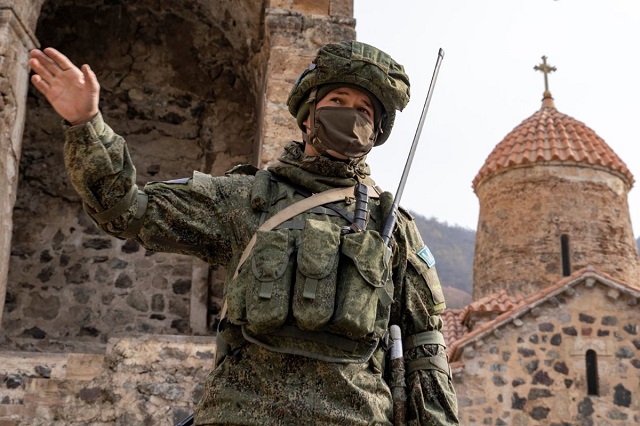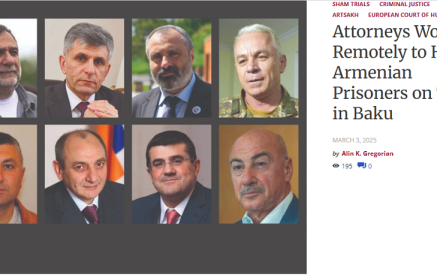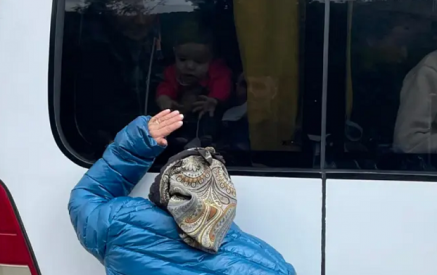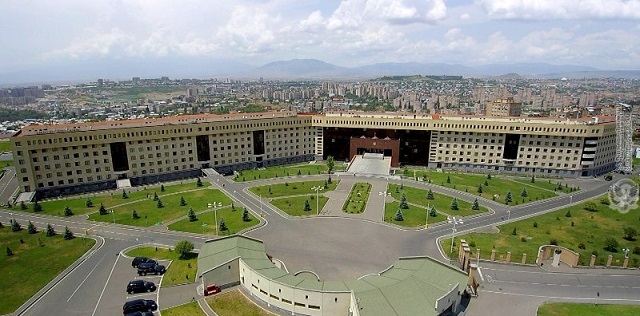By Elena Rodina, Europe and Central Asia Research Associate
Journalists who covered the recent six-week-long conflict between Armenian and Azerbaijani forces in the breakaway region of Nagorno-Karabakh faced violence to get the story of the region’s latest bloody chapter to the world. At least six journalists were injured in shelling attacks in Nagorno-Karabakh and two were assaulted when a mob descended on a broadcaster in Armenia to oppose its reporting on the November 9 peace treaty, as CPJ documented. CPJ issued safety advice for journalists covering the conflict.
Nagorno-Karabakh, located within Azerbaijan’s borders, has been under the control of ethnic Armenian forces since a 1994 truce. Fighting again broke out on September 27, with hundreds and possibly thousands killed, according to reports. In the November 9 peace treaty, Armenia ceded certain territories to Azerbaijan.
BBC Russia correspondent Marina Katayeva covered the most intense weeks of fighting in Nagorno-Karabakh. She spoke to CPJ via messaging app on November 8 from Yerevan, the Armenian capital, just after she left the conflict zone, and again on November 12, also from Yerevan, about the challenges of working in war, safety measures for reporters, and the importance of journalistic camaraderie. For security reasons, Katayeva writes under a pseudonym, which CPJ has also used in this interview. The interview has been edited for length and clarity.
Read also
Had you covered conflict before, and how did you decide to cover Nagorno-Karabakh?
I have never covered conflicts before, and my decision to go to Nagorno-Karabakh was dictated by my desire to go into the field, given that for half a year before that I had worked from home [due to COVID-19]. I wanted to finally see people, not just write articles based on phone interviews. Plus, I had been in Armenia before and knew the region.
Can you describe your daily routine while covering the conflict?
My workdays are almost never the same. Planning is almost impossible because the situation is changing daily. But there are some rituals that I start every day with: checking social networks, calling people in the conflict zone whom I want to feature in an article. If the situation hasn’t evolved overnight, I proceed with what I planned for that day – meeting with people, recording interviews. If the road back to the hotel from the location takes a long time, I write the article while still in the car, using the Notes app on my phone.
What do you do to make sure you’re protected?
In our team, everyone has a bulletproof vest and a helmet, and we also brought those for our driver-interpreter. The main protocol is to not take these off if we hear shots or explosions and wear them in the zones where shelling can potentially start. When planning a trip to an area where the conflict is ongoing, we try to find a hotel with a basement. In Stepanakert [the de-facto capital of Nagorno-Karabakh] a couple of times we went to bed fully clothed in case of the nighttime shelling.
How do you find out about safety concerns in a particular area?
You can only learn about safety by calling a specific village or a city where you are going to and by asking the locals. Unfortunately, this doesn’t always work. Shelling can start at any moment; it can catch you in the beginning of your visit or toward its end. Also, you cannot rely entirely upon the local peoples’ safety evaluations, simply because they do not always consider the situation around them dangerous. To any question about safety they would answer that “Everything is good, there is no danger.” And then they would proceed to tell you how the day before a shell had landed in their yard and got stuck in the ground next to an apple tree, unexploded.
What is the most difficult part of covering Nagorno-Karabakh?
As in all conflict zones, the main difficulty is staying safe. It is impossible to guarantee full safety or predict anything here. There is also a question of difference of opinions. It is almost impossible to hear an alternative point of view on the events; it is natural and common for all the war zones, especially when the conflict has to do with the land or the integrity of a state.
You are covering this conflict during a global pandemic. How do you and your team protect yourselves from the virus?
Almost no one thinks about COVID-19 in the immediate proximity to the conflict zone – people who spend nights hiding in basements have different priorities. On the other hand, in Yerevan the rules are very strict: you are obliged to wear a mask in every store or closed space. Police can stop you on the street and ask you to put on a mask. I am going with the flow, so I am not wearing a mask in the conflict zone and I put it on when I leave it.
How has working in Nagorno-Karabakh impacted you personally?
I was most touched by a story of a refugee who had a birthday while he was staying in one of the hotels in Goris [a town in southern Armenia close to the Nagorno-Karabakh border]. The owner of the hotel decided to prepare a surprise for him, having learned that he would be turning 65 years old. She ordered a cake with candles, and when all the refugees gathered together for dinner, she turned the light off in the dining room and brought out that cake, playing loud music. While everyone around was applauding and congratulating him, the man looked at the cake with an empty stare, and all he could say was “Thank you.” Later I spoke with him and his wife, and learned that their sons were at war, and they came from Hadrut [the site of heavy fighting in Nagorno-Karabakh] leaving all their possessions behind, having the time to only grab their documents.
In the duration of the whole work trip to Karabakh, my dominant emotion was sadness. I felt bad for the people who lose their houses, who must spend their days, sometimes weeks hiding in basements. I was sad that the war became routine for them, and that they organized their daily lives with a potential bombing in mind. The saddest thing is not that people complain or cry — I have almost never seen it here — but that they keep quiet or tell me that they are “doing just fine.”
When you are covering a conflict for so long, does the sense of danger eventually diminish?
Some people say that the feeling of danger changes with time, but not for me. Perhaps this is because during this trip I have been responsible not only for myself, but our whole journalistic team. I would not risk their safety, no matter how important of a story I had to cover.
Do journalists covering Nagorno-Karabakh help each other and share information and resources?
Journalists are friendly with each other. Almost everyone crosses each other’s paths in the hotels of Goris or in Karabakh itself, and many get acquainted in the basements in Stepanakert. In these places people forget about competition and try to help each other. Of course, we are all looking for unique characters, unusual stories, and exclusive shots. But there is no animosity among journalists here.
Elena Rodina, a native of Kazan, Russia, worked as a Moscow-based sociopolitical correspondent for Ogoniok, one of the oldest weekly Russian magazines, and Esquire Russia. Her journalism and research have been published in Caucasus Survey, Digital Ethics, Time Out Chicago, Newcity, Media and Communication, and Zeitschrift fur Slavische Philologie, among other outlets. Rodina holds a PhD in Communication Studies from Northwestern University, and an MA in Russian, East European, and Eurasian Studies from the University of Oregon, in addition to her bachelor’s degree in Romanic-Germanic Philology from Russia’s Kazan Federal (former State) University.
Committee to Protect Journalists
Caption: A Russian peacekeeper gestures in the yard of the 12th-13th century Orthodox Dadivank Monastery on November 16, 2020, after the monastery was put under Russia’s protection as part of the peace agreement putting an end to the military conflict between Armenia and Azerbaijan over the breakaway region of Nagorno-Karabakh. BBC journalist Marina Katayeva spoke to CPJ about covering the conflict. (AFP/Andrey Borodulin)

























































